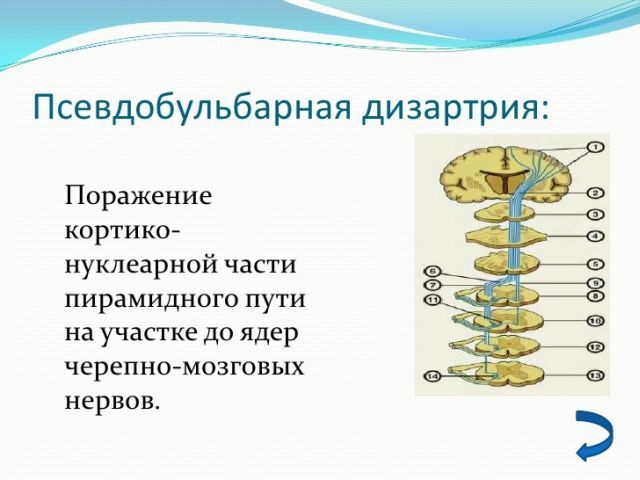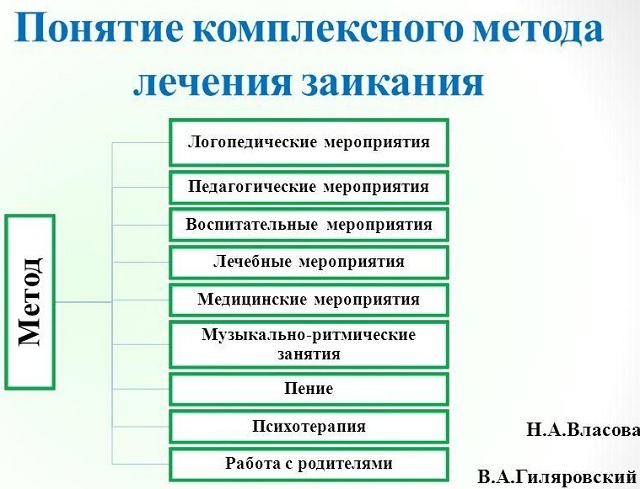 Speech stereotypes, also known as verbal iterations, verbal tics, are reflexive, devoid of meaning and emotionally indifferent repetitions of sounds, syllables, words and whole phrases in a patient's speech.
Speech stereotypes, also known as verbal iterations, verbal tics, are reflexive, devoid of meaning and emotionally indifferent repetitions of sounds, syllables, words and whole phrases in a patient's speech.
The patient's speech can be either with his own initiative, or be provoked by questions from surrounding people.
Content
- Types of speech stereotypes
- Perseveration - persistence persistent we sing odes
- verbigeration - common destiny schizophrenics
- Standing momentum
- palilalia
- Echolalia
- Speech stereotypes and neuropsychiatric diseases
- reasons perseverations
- What provokes verbigeration
- Reasons standing speed palilalia and echolalia
- Diagnosis
- Therapy and correction
Types of speech stereotypes
Several types of speech stereotypes are known: usa repetition of one inference or word( perseveration), the repetition of the same expression, the turnover of speech( standing revs), the repetition of words or syllables in a certain rhythm, or in rhymed form( verbigerization).
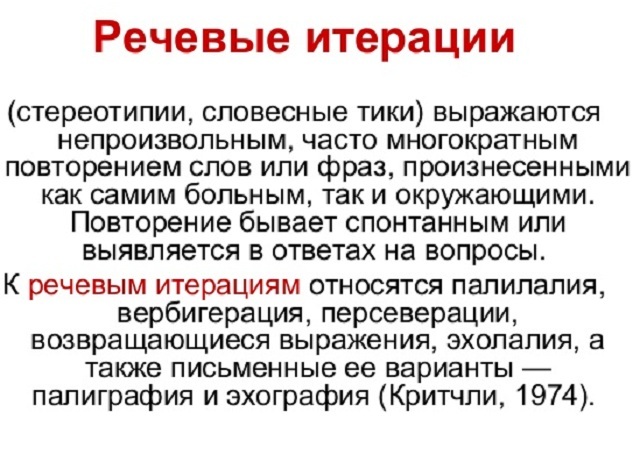
Perseveration - perseverance of persistent singers we odes
The term perseveration comes from the Latin word perseveratio, which means "persistence", "perseverance".In speech, perseveration is manifested as the repeated reproduction of certain syllables, words or sentences.
In the patient's mind, it seems that the word or thought is "stuck", and it repeats it repeatedly and monotonously when communicating with the interlocutor. In this case, the repeated word or phrase is not relevant to the topic of conversation. The patient's speech is monotonous. Perseveration can manifest itself either verbally or in writing.
Perseveration is the result of association activity, part of consciousness and does not happen by chance. Do not confuse it with intrusive phenomena, since the latter have an element of obsession, and the patient realizes the absurdity of his actions.
Verbigeration - a frequent destiny of schizophrenics
Mental disorder, in which the patient repeats, screams monotonously with the same interjections, words, phrases. These repetitions are automatic and meaningless, can last several hours and even days.
Patient rhythmically, often in rhyme, repeats words, and combinations of sounds that do not make sense. It is necessary to distinguish verbigeration from perseveration, since during the last repetition they depend on the neuro-psychic states, and disappear with the elimination of these states.
Standing speed
Standing turns are scraps of phrases, expressions, words, similar ideas that the patient repeatedly reproduces during the  conversation.
conversation.
Initially, the patient pronounces them with the same intonation, and subsequently simplifies, reduces and the process reduces to stereotyped repetition of words.
Often spoken standing rpm is highly distorted and it becomes impossible to understand their original meaning and sound.
Palilalia
Palalalia refers to the repetition of a phrase to a patient, or a part of it, a single word or syllable, from a speech fragment he himself pronounced, two or more times in a row.
Recurrence occurs at normal voice volume, gradually the volume may drop, and the speech rate becomes faster. For example, giving the answer to a question, the patient repeatedly and continuously repeats the answer.
Manifestations of palalalia refer not only to intellectual forms of speech, but also to emotional( exclamations, shouting).However, it usually does not relate to automatically pronounced conversions of automated speech. The number of repetitions can reach two dozen or more.
Echolalia
With echolalia, the patient repeats the phrases and words that were spoken by the people around him. Often, echolalia is inherent in young children, and this is not a pathology in them.
Pathology is considered when echolalia becomes the cause of mental retardation, or development occurs in an adult.
Speech Stereotypies and Psychoneurological Diseases
Reasons for speech stereotypes often lie in the development of neurological and psychological diseases.
The reasons for perseveration
 Experts consider the defeat of the lower sections of the premotor cores of the cortex of the left hemisphere in right-handers the reason for perseveration, and left-handed people in the right hemisphere.
Experts consider the defeat of the lower sections of the premotor cores of the cortex of the left hemisphere in right-handers the reason for perseveration, and left-handed people in the right hemisphere.
The most common reason for the occurrence of perseveration is neurological diseases that are caused by brain damage of a physical nature. In this case, it becomes impossible to switch between different activities, changing the course of thoughts and the order of actions when performing various tasks.
In the neurological nature of the disease, the causes of the appearance of perseveration are:
- Craniocerebral injuries of , in which the lateral orbitofrontal cortical areas and its prefrontal bulges are affected.
- Aphasia - the appearance of violations in speech, formed in the previous life stage. These disorders occur due to physical damage to speech centers, as a result of craniocerebral trauma, encephalitis, brain tumors.
- Pathologies related to the region of the frontal lobes of the cerebral cortex .
Psychiatry and psychology relate perseveration to signs of various phobias and anxiety syndromes. The flow of this speech stereotype in the psychological and psychiatric direction can be caused by:
- obsession and selectivity of individual interests, which is most often found in people with autism;
- a lack of attention with hyperactivity, while stereotypy arises as a protective mechanism, to attract attention to itself;
- a relentless pursuit of learning and learning new can lead to fixation on one reasoning or activity;
- perseveration is often one of the symptoms of obsessive-compulsive disorder.
Perseverations are more often observed in patients with dementia( dementia), which is caused by vascular lesions of the brain, as well as with age-related atrophic processes in the brain. The patient's intellect is broken, and he can not understand the question asked and instead of the logical answer repeats the previously used phrases.
What provokes the development of verbigeration
With verbigeration there is no connection with certain neuropsychiatric conditions. One of the features of verbigeration is that the patient pronounces words without manifestations of affect. As a rule, verbal repetitions are accompanied by active facial expressions and motor impairments.
Most often, verbal iterations occur in patients with dementia and catatonic schizophrenia.
Causes of standing revs, palalalia and echolalia
The appearance of standing rumors in speech signals a decrease in intelligence, devastation of thinking. Often they appear with such 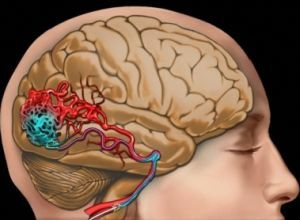 disease as epileptic dementia. Also, one of the diseases characterized by standing rises is Pick's disease, as well as other atrophic brain diseases.
disease as epileptic dementia. Also, one of the diseases characterized by standing rises is Pick's disease, as well as other atrophic brain diseases.
Palilalia is a typical manifestation of Pick's disease. Also often accompanies such diseases as striatal pathology, striopallidal pathology( atrophic, inflammatory, vascular), postencephalic parkinsonism, pseudobulbar syndrome, catatonia, Tourette syndrome, schizophrenia.
The occurrence of echolalia is often associated with damage to the frontal lobes of the brain. If the patient has such symptoms as hallucinations, impaired coordination, forgetfulness, it is necessary to seek the advice of a specialist. If brain damage is not diagnosed, then the reasons for the development of echolalia may be imbecility, schizophrenia, autism, Asperger syndrome, Tourette's syndrome.
Diagnosis of
Diagnosis of speech stereotypes involves complex testing. The patient is asked to undergo special testing or answer simple questions( meaning "yes" or "no" answers), repeat similar sound or sound combinations.
Also the patient is invited to name the items that are in the room, to name the days of the week, to clarify the meaning of words, to retell the text.
 It is very important when examining a patient to determine whether he understands speech addressed to him. If there are suspicions of the presence of mild forms of speech disorders, the defectologist applies other more sophisticated diagnostic methods.
It is very important when examining a patient to determine whether he understands speech addressed to him. If there are suspicions of the presence of mild forms of speech disorders, the defectologist applies other more sophisticated diagnostic methods.
For the diagnosis of speech stereotypes, a technique is used that includes a series of individual tests. The patient is encouraged to write the words in ordinary and reverse order, write words and phrases in uppercase and lowercase letters, read the text in direct and reverse order, write numbers in the usual and inverted form, multiply. When conducting toasts, the doctor estimates the number of correct and incorrect answers per minute.
Therapy and correction
Treatment of patients with speech stereotypies implies the following methods:
- pharmacotherapy;
- exercise therapy;
- psychotherapy;
- psychological correction;
- physiotherapy;
- logotherapy;
- work with defectologists.
It is necessary to start therapy with the treatment of the main provoking disease. The ability to restore the speech function will 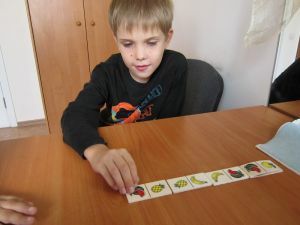 depend on the main diagnosis.
depend on the main diagnosis.
If the patient has aphasia, the main focus is on automated speech, then the patient is gradually taught to comprehend and separate the main from the secondary. If the main disease is dementia, during therapy, attention is focused on the semantic meaning of words. Patients with a mild form of schizophrenia are taught the correct construction of sentences that preserve the semantic content.
In Western countries, in the treatment of these disorders, the main emphasis is on the medication method of therapy. The most widely used antipsychotics. They contribute to changes in the pathological processes of the brain.

